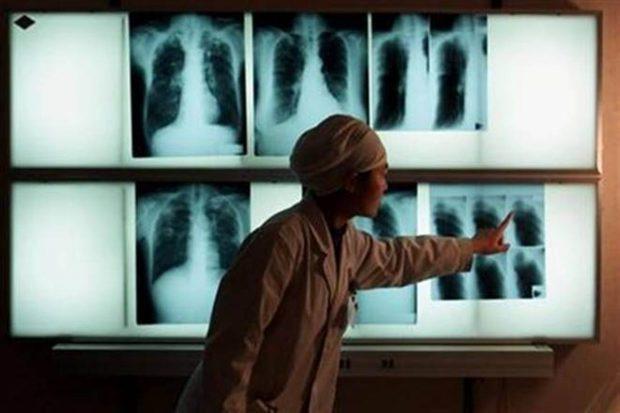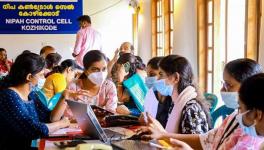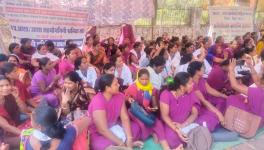Health Ministry Report Says over 24 Lakh TB cases in India in 2019

Over 24 lakh cases of tuberculosis were reported in India in 2019, according to the India TB Report 2020, released by the Ministry of Health and Family Welfare (MoHFW) on June 24. Out of the total, more than 11 lakh (47%) cases are currently being treated, while for another 47%, treatment had been initiated and their “outcome assigned”, according to the report.
In July 2019, the health ministry signed a Memorandum of Understanding (MoU) with the Ministries of Defence, Railways, and the AYUSH ministry to eliminate tuberculosis from India by 2025. The MoU was signed in the presence of Ashwini Choubey, Minister of State (MoS) for MoHFW and the MoS for the AYUSH ministry, Shripad Nayak. In March 2018, Prime Minister Narendra Modi had announced that India would eliminate the disease in the next six years.
According to the report, the total number of notifications in the year 2018 were 21,02,828. Out of these, 4,83,781 cases were notified by the private sector, while 16,19,047 notifications were raised by the public sector. Treatment was initiated in 96% of the cases, and was successful in 80% (16,79,267) of the cases. However, 79,144 people lost their lives to the disease in 2018. The report said that 1,44,332 notifications – seven per cent of the total notifications, were not evaluated.
According to the Global Tuberculosis Report 2019, published by the World Health Organisation (WHO) in October 2019, India was among eight countries that accounted for two-third of the total number of TB cases in the world in 2018. The eight countries were India (27%), China (9%), Indonesia (8%), the Philippines (6%), Pakistan (6%), Nigeria (4%), Bangladesh (4%) and South Africa (3%). The aforementioned countries and 22 others found their place in WHO’s list of 30 countries with the highest TB burden, accounting for 87% of the world’s cases. As per the WHO report, the total number of TB incidences in India in 2018 were 26,90,000.
The MoHFW report said, “2019 marks another milestone year for TB surveillance effort in India, with a record high notification of 24 lakh cases; an increase of over 12% as compared to 2018. This translates to an incident notification rate of approximately 159 cases/lakh against the estimated incidence rate of 199 cases per lakh population.”
The largest proportion of increase came from the private sector. In 2019, the private sector contributed 6.79 lakh notifications, approximately 28% of the total number of notifications. It is an increase of 25% over the numbers in 2018. However, this could imply that a larger proportion of patients are now availing of the private sector for treatment, either by choice or due to circumstances.
Undernutrition is a strong risk factor for developing TB, and contributes to an estimated 55% of the annual TB incidence in India. The MoHFW report said: “It is known to adversely affect the immune system, fasten the progress of disease from infection and predispose to poor outcomes. The catabolic effect of TB results in weight loss and wasting, worsening the malnutrition. So, considering that malnutrition can increase the vulnerability to the disease, optimum nutrition support is important for a patient with TB.”
WHO has put down nutrition screening, its assessment and management as integral components of TB treatment and care, due to the clear bi-directional causal link between undernutrition and active TB. An adequate diet, which contains all essential macro and micro nutrients, is necessary for the well-being and health of all people, including those with TB infection or TB disease.
Paediatric Tuberculosis (TB) is one of the ten major causes of mortality among
children (population age less than 15 years) globally. In 2018, an estimated 11 lakh children became ill with TB and 2,50,000 children died of TB (including children with HIV associated
TB). In India, about 3,42,000 incident cases of paediatric TB are estimated to occur every year, accounting for 31% of the global burden and 13% of the overall TB burden in the country.
A factor that affects the process of eradicating TB in India is the lack of funding from the Centre. According to the TB India Report 2020, there was a huge difference between the funds requested for the National TB Elimination Programme and the corresponding budget allocation and funds released by the Centre.
In the years since the Modi government has been in power – till January, 2020, that is, between the fiscal years 2014-2015 and 2019-2020 – the budget requested for the programme was Rs 13,498 crore. However, the total budget allocation for the programme was Rs 10,303.36 crore, about 76.33% of the requested budget. Further, funds released by the government to the states was Rs 3,719.46 crore, while the total expenditure was Rs 9,398.62 crore, about 69.63% of the requested budget.
Get the latest reports & analysis with people's perspective on Protests, movements & deep analytical videos, discussions of the current affairs in your Telegram app. Subscribe to NewsClick's Telegram channel & get Real-Time updates on stories, as they get published on our website.
























